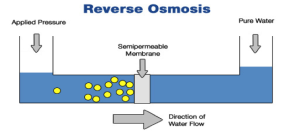Recipe of the Day
Testimonials
How healthy a beverage is for you must begin with the quality of the water that is used. Syfo Beverages has always used a multi-step water purification process that includes reverse osmosis. But what is the benefit of reverse osmosis and why is it important?
 Reverse osmosis is a process in which water is forced through a semi-permeable membrane using pressure. Water will pass through the membrane, leaving the contaminants behind. Reverse osmosis purification systems remove up to 99% of all contaminants found in water, which is more than other filtration methods. Additionally, reverse osmosis removes particles smaller than what other filtration methods can remove.
Reverse osmosis is a process in which water is forced through a semi-permeable membrane using pressure. Water will pass through the membrane, leaving the contaminants behind. Reverse osmosis purification systems remove up to 99% of all contaminants found in water, which is more than other filtration methods. Additionally, reverse osmosis removes particles smaller than what other filtration methods can remove.
The process we use involves pre-treatment steps that include double-micron and carbon filtration so that the reverse osmosis system works at the highest efficiency and peak performance ensuring an effective barrier to pathogens, metals, toxins, chemicals, parasites, pesticide, algae and other solids.
To further ensure that the water in our beverages is the highest quality, the water then passes through a deionization system, which removes ions of compounds like sodium and iron. Lastly, the water is ozonated and sterilized using UV exposure to kill any organic matter that could be left in the water.
You can drink Syfo with confidence knowing that you’ve bought one of the purest and healthiest beverages around. To learn more about what makes our beverages healthy, click here.
Recently, news sources have reported that some companies may not be entirely transparent with the ingredients in their food and beverages that are labeled as containing “natural flavors.” So what makes a food or beverage flavoring truly natural?
According to the FDA, natural flavors are the essential oil, oleoresin, essence, extractive, protein or any product derived from roasting or heating that “contains the flavoring constituents derived from a spice, fruit or fruit juice, vegetable or vegetable juice, edible yeast, herb, bark, bud, root, leaf of similar plant material, meat, seafood, poultry, eggs, dairy products, or fermentation products thereof, whose significant function in food is flavoring rather than nutritional.”
That’s not only quite mouthful but also a pretty broad definition. Translated, any process that extracts the flavor from a fruit, vegetable, dairy or animal product would be considered natural. This is opposed to combining chemicals in a laboratory to mimic or simulate the flavor.
Where it gets confusing is the other additives that are used either during or after the process. Some companies add preservatives, including MSG, which is both a preservative and a flavoring, into their natural flavors. Propylene glycol, a derivative of natural gas, is used by some beverage manufacturers as a solvent and humectant. Brominated vegetable oil (BVO) is an oil derived from soy that is used by some soda brands as an emulsifier to keep their flavorings from floating to the top of the drink. The bromine in BVO is a known endocrine disrupter and has been banned as a food ingredient throughout Europe and Japan.
So as you can see, plenty of products can be labeled as having “natural flavors” but what you’re consuming is anything but natural. Syfo Beverages’ natural flavors do not include propylene glycol, BVO or any other preservatives added during or after our flavor extraction process. Our all-natural flavors are derived from the essential oil that is extracted from the peel of the fruit. Instead of propylene glycol, we use vegetable-based glycerin that naturally keeps the product moist and inhibits bacteria growth.
Plus all of our products use water that is purified through reverse osmosis and they contain no sugar, artificial sweeteners, sodium or any other additives. So if you’re looking for a refreshing beverage that is both healthy and natural, reach for Syfo.
Staying hydrated is a good idea all year round, but as temperatures rise in the summer, it’s important to drink enough fluids to combat the heat. Many people don’t enjoy sticking with plain water, but if they turn to other beverages like soda, they may not be getting the benefits of hydration and actually what they drink could have the opposite effect.
It’s true that all beverages contain some water, but practically speaking, caffeinated, sweetened and alcoholic drinks pack chemical cargoes (or trigger chemical reactions) that demand significant amounts of fluid to properly process and filter. Chief among these are sugar and caffeine, so as your body works to move these substances through your body, your body’s actual stores of fluids may be reduced. According to an article on the care2.com website, this has led some experts to believe that non-water beverages actually dehydrate the body.
In another article on diabeteslibrary.org, the website reports that “the body will attempt to dilute the high level of glucose in the blood by drawing water out of the cells and into the bloodstream in an effort to dilute the sugar and excrete it in the urine.” This dynamic can be compounded by the levels of caffeine in soda, which can have an additional diuretic effect.
Syfo Beverages Naturally-Flavored Sparkling Waters contain no sugar, caffeine, artificial sweeteners or any other additives, so they’re just pure hydrating refreshment. And since they’re made using 100% purified water with all-natural flavors, they’re a healthy way to stay hydrated throughout this hot summer and all year long.
“Sip All Day, Get Decay” is more than a catchy slogan. It’s a campaign with the purpose to bring awareness to the nation’s growing dental concerns and correlation between soda and tooth decay.
According to the National Health and Nutrition Examination Survey, approximately 50% of the population in the US aged two or older consumes sugar-based drinks on any given day and more than half of these sugar-based drinks are consumed at home. According to the CDC, almost 60% of high school students drink a minimum of one sugar-based beverage every day. Even more surprising, SipAllDay.org reports that one-fifth of all one- and two-year old children drink soda.
Not only have soda and other sugar-laden drinks been linked to obesity, diabetes and high-blood pressure, but soda and sugar-based beverage drinkers must also be concerned with tooth decay. In a study conducted by Bernabe, Vehkalahti, Sheiham, Aromaa and Suominen published in the Journal of Dentistry, the researchers set to explore the association between cavities and the frequency of sugar-based beverages consumed. They found that the higher the consumption of sugary drinks, the higher the amount of teeth affected by cavities. Surprisingly, the researchers found that the use of fluoride toothpaste did not reduce the risk of dental cavities when drinking sugar-based drinks regularly. The Wisconsin Dental Association also points out that the kind of sugar in soda and other sweetened beverages combines with the bacteria in your mouth to form acid, which attacks the enamel of your teeth.
Consider replacing your daily soda habit with Syfo. Syfo Naturally-Flavored Sparkling Waters and Original Seltzer are made from 100% purified water and have no sugar, artificial sweeteners, sodium, preservatives or any other additives. Just delicious, natural refreshment, Syfo is a healthy and satisfying alternative to soda.
Seltzer and club soda – many people use them as mixers or drink them on their own. Both are types of carbonated water and the terms are often used interchangeably causing many people to assume they’re the same thing. But there are important differences between the two, so we thought it would be helpful to clear up some of the confusion.
Seltzer
Seltzer is plain water that has been carbonated and does not contain any sodium salts. The word seltzer is derived from the name of a town in Germany called Selters. The town of Selters was home to a naturally-carbonated water spring that was discovered around the year 1000. Unfortunately, the spring’s resources were completely consumed by the end of the 19th century.
When it comes to seltzer, our Syfo Original Seltzer is one of the purest, healthiest and most refreshing seltzers you can buy. It’s made with water that’s purified though a seven-step process that includes reverse osmosis. Our Original Seltzer and our Naturally-Flavored Sparkling Waters are free of preservatives, sodium, artificial sweeteners, sugar or any other additives.
Club Soda
Although sometimes confused with seltzers, club soda is very different. Club soda is carbonated water that has mineral-like ingredients added for taste. These ingredients normally include salts such as potassium bicarbonate, sodium bicarbonate, potassium sulfate, potassium citrate and table salt.
If you’re trying to reduce minerals like salt in your diet, try reaching for a bottle of seltzer instead for the perfect mixer or a refreshing beverage that’s perfect on its own.


 "I bought Syfo's Lemon-Lime at Publix last week in Nashville and I’ll always remember my first time! So crisp and refreshing with the perfect amount of flavor. Sign me up!"
"I bought Syfo's Lemon-Lime at Publix last week in Nashville and I’ll always remember my first time! So crisp and refreshing with the perfect amount of flavor. Sign me up!"